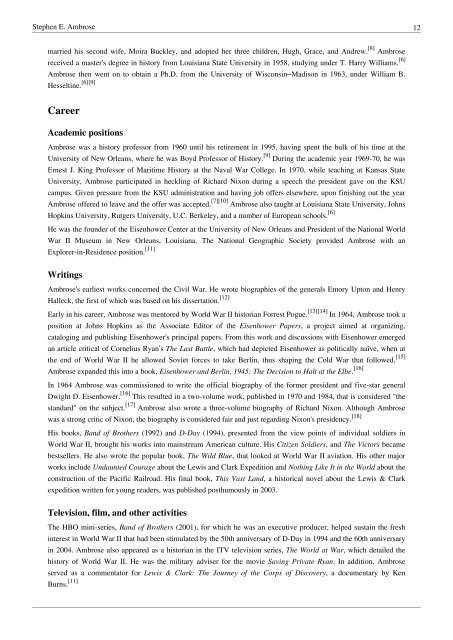Band of Brothers mini series - strangecharms
Band of Brothers mini series - strangecharms
Band of Brothers mini series - strangecharms
You also want an ePaper? Increase the reach of your titles
YUMPU automatically turns print PDFs into web optimized ePapers that Google loves.
Stephen E. Ambrose 12<br />
married his second wife, Moira Buckley, and adopted her three children, Hugh, Grace, and Andrew. [8] Ambrose<br />
received a master's degree in history from Louisiana State University in 1958, studying under T. Harry Williams. [6]<br />
Ambrose then went on to obtain a Ph.D. from the University <strong>of</strong> Wisconsin–Madison in 1963, under William B.<br />
Hesseltine. [6][9]<br />
Career<br />
Academic positions<br />
Ambrose was a history pr<strong>of</strong>essor from 1960 until his retirement in 1995, having spent the bulk <strong>of</strong> his time at the<br />
University <strong>of</strong> New Orleans, where he was Boyd Pr<strong>of</strong>essor <strong>of</strong> History. [9] During the academic year 1969-70, he was<br />
Ernest J. King Pr<strong>of</strong>essor <strong>of</strong> Maritime History at the Naval War College. In 1970, while teaching at Kansas State<br />
University, Ambrose participated in heckling <strong>of</strong> Richard Nixon during a speech the president gave on the KSU<br />
campus. Given pressure from the KSU ad<strong>mini</strong>stration and having job <strong>of</strong>fers elsewhere, upon finishing out the year<br />
Ambrose <strong>of</strong>fered to leave and the <strong>of</strong>fer was accepted. [7][10] Ambrose also taught at Louisiana State University, Johns<br />
Hopkins University, Rutgers University, U.C. Berkeley, and a number <strong>of</strong> European schools. [6]<br />
He was the founder <strong>of</strong> the Eisenhower Center at the University <strong>of</strong> New Orleans and President <strong>of</strong> the National World<br />
War II Museum in New Orleans, Louisiana. The National Geographic Society provided Ambrose with an<br />
Explorer-in-Residence position. [11]<br />
Writings<br />
Ambrose's earliest works concerned the Civil War. He wrote biographies <strong>of</strong> the generals Emory Upton and Henry<br />
Halleck, the first <strong>of</strong> which was based on his dissertation. [12]<br />
Early in his career, Ambrose was mentored by World War II historian Forrest Pogue. [13][14] In 1964, Ambrose took a<br />
position at Johns Hopkins as the Associate Editor <strong>of</strong> the Eisenhower Papers, a project aimed at organizing,<br />
cataloging and publishing Eisenhower's principal papers. From this work and discussions with Eisenhower emerged<br />
an article critical <strong>of</strong> Cornelius Ryan’s The Last Battle, which had depicted Eisenhower as politically naîve, when at<br />
the end <strong>of</strong> World War II he allowed Soviet forces to take Berlin, thus shaping the Cold War that followed. [15]<br />
Ambrose expanded this into a book, Eisenhower and Berlin, 1945: The Decision to Halt at the Elbe. [16]<br />
In 1964 Ambrose was commissioned to write the <strong>of</strong>ficial biography <strong>of</strong> the former president and five-star general<br />
Dwight D. Eisenhower. [16] This resulted in a two-volume work, published in 1970 and 1984, that is considered "the<br />
standard" on the subject. [17] Ambrose also wrote a three-volume biography <strong>of</strong> Richard Nixon. Although Ambrose<br />
was a strong critic <strong>of</strong> Nixon, the biography is considered fair and just regarding Nixon's presidency. [18]<br />
His books, <strong>Band</strong> <strong>of</strong> <strong>Brothers</strong> (1992) and D-Day (1994), presented from the view points <strong>of</strong> individual soldiers in<br />
World War II, brought his works into mainstream American culture. His Citizen Soldiers, and The Victors became<br />
bestsellers. He also wrote the popular book, The Wild Blue, that looked at World War II aviation. His other major<br />
works include Undaunted Courage about the Lewis and Clark Expedition and Nothing Like It in the World about the<br />
construction <strong>of</strong> the Pacific Railroad. His final book, This Vast Land, a historical novel about the Lewis & Clark<br />
expedition written for young readers, was published posthumously in 2003.<br />
Television, film, and other activities<br />
The HBO <strong>mini</strong>-<strong>series</strong>, <strong>Band</strong> <strong>of</strong> <strong>Brothers</strong> (2001), for which he was an executive producer, helped sustain the fresh<br />
interest in World War II that had been stimulated by the 50th anniversary <strong>of</strong> D-Day in 1994 and the 60th anniversary<br />
in 2004. Ambrose also appeared as a historian in the ITV television <strong>series</strong>, The World at War, which detailed the<br />
history <strong>of</strong> World War II. He was the military adviser for the movie Saving Private Ryan. In addition, Ambrose<br />
served as a commentator for Lewis & Clark: The Journey <strong>of</strong> the Corps <strong>of</strong> Discovery, a documentary by Ken<br />
Burns. [11]


